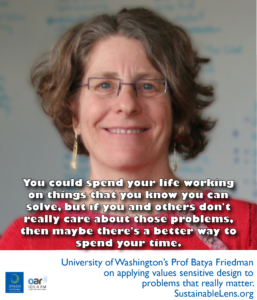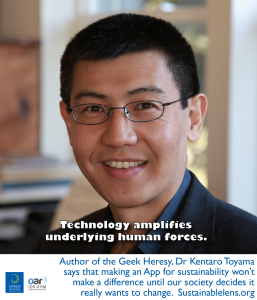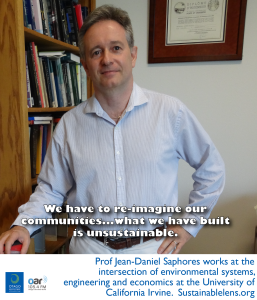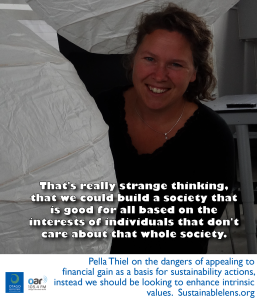Multi-lifespan information systems, starts with premise that there are certain categories of problems that we’re unlikely to solve in a single human lifespan.
Dr Batya Friedman is a Professor in the Information School at the University of Washington. She tells us how her early interests in science, arts, education and politics all came together in value sensitive design. Batya’s recent work in multi-lifespan information systems has lessons for sustainability – in particular, the implications for intergenerational equity.
Talking points
Interested in how people organise society, and the choices they make, what sort of society we want to build and what tools we want to build – those themes have stuck with me.
Science museum…exploring residues that we create when we do any kind of work. What is the work we are doing, and when does that justify the kinds of waste we are producing?
I was teaching in a situation where we had 8 computers for 15 kids, traditionally the teacher would allocate them, but I turned it around to the students a and said how are we going to share these? And they came up with policies, and we would vote on those, and them implement them, and then reflect… the policies started to change as the kids saw what the implications and consequences where for this small community, and so they took those things into account as they allocated the resources they were using. It put in their hands this issue of resource allocation., and they were able to have their own conversations about what’s fair, what’s just, how do we create a caring society in our classroom around these kinds of resources. There wasn’t any whining about access to technology, there was mature conversation. The students learned to express what their needs were, what their desires were, and to listen to what other kids’ needs and desires were
graduate
(Thesis) Kids understand canonical things – stealing a bike, a car – the nature of the harm is clear, but when you move to the digital realm, it isn’t so clear to them what are the natures of the harm.
When we have new technologies and the conventions around them are not well understood, the adolescents I worked with fell back on moral reasoning – trying to identify harms, and then trying to identify the harms, and then coming up with a way of acting in the world that was respectful of the harms that they understood.
Human beings are tool users, and our tools become a part of what we do and how we go about being in the world. So there’s no strong delineation between a tool-use act, and a non-tool use act
We act in the world and we act with our tools
And as we act in the world, we ask ourselves these questions…am I hurting somebody by engaging in this action, is this fair…what’s the nature of justice, am I building community, am I being a good friend to somebody, am I being generous? These questions these qualities are part of how we want to be in the world, and technologies are an integral part of that.
The issue isn’t whether there is technology of a tool there, the interesting moment is when we introduce a new technology that gives us a very different way of acting or being in the world and we are unfamiliar with the ways in which it will intersect with all the other things we are doing.
By being conscious and intentional about some of the value implications that we are more likely to have effects that are positive or at least to avoid some of the more egregious negative impacts.
Designers of technology don’t control all the aspects of how these technologies will be appropriated and used by society, but they do control some of the important pieces. And if we don’t attend to those then I think there may be inadvertent consequences where had we been attentive, we could have been proactive on something positive.
Does the technology embody values? – yes, the architecture of the technology makes somethings easier and other things harder if not impossible.
Historically the greatest protection on privacy was just the amount of effort it would take. Rules and practices evolved from a time when you had to physically go down to the courthouse and look at records if you thought something was amiss, but it was accessible to you, you could examine them if you thought there was good need. Now you can do that search from your house, with very little effort. That balance between privacy and transparency, that delicate balance in place for a certain kind of technology, that has been changed. So the question for society is what balance do we want between privacy and transparency, then to put in place the technical infrastructure so we can experience that balance that we think is beneficial for society.
We hold a multiplicity of values, and they all sit in delicate balance with each other, just like the strands of a spider-web. If you pick up one value, put pressure on one part of the web, all the other values move with it. Two things can be in tension and together that tension holds them up. These tensions and how they sit in relation to one another is the nature of human life. So the question is how do we hold onto them. Take something like calmness, or the desire to be left alone, and also the desire to be part of community, also to be able to be responsive if someone has a need or emergency. We value all of those things simultaneously – holding onto that is the design challenge.
We can question the presumption about building more and more widgets. How many microprocessors do people have? We can ask is that sustainable? In therms of the resources, power? We’re building things now with the presumption of 24/7 access to power and network, and people are increasingly putting data and activities that are critical to their lives into infrastructure that needs to be on and functioning 24/7. We created this idea of 24/7 ubiquity, we can question that.
Multi-lifespan work, starts with premise that there are certain categories of problems that we’re unlikely to solve in a single human lifespan.
Multi-lifespan because of the nature of the problem: 1. limitations of the human pscyhe…lasting peace…first generation agree to keeping children alive, second generation grow up in environment where they don’t feel threatened, maybe third generation can really build a peace. 2. tears in social fabric (Rwanda) 3. Environmental timescales
We need to recognise that these problems and solutions are going to unfold over longer periods of time.
How do we engage in this longer term design thinking? We can help people understand where their lifespan fits, how that relates in to environmental time-frames, so you can begin to see how decisions in your lifespan can begin to affect and mesh with what might be going on on an environmental timeline. We can think about doing supporting people doing co-design 20-40 years in the future. What might be the systemic conditions in 40 years? then we can bring people back to “well what if we made some different design choices now?”
We’re at the start of the development of systems of international justice – just like where democracy was 200 years ago.
While can be discouraged about how our societies are evolving, we can point to areas of real progress, and that’s really important to hold onto
Take skeptism seriously, then go build something
Starting to do the work, slowly doing the work as best one can, trying to having eyes open to complexity, then over time one has a proof of concept about how you could make progress.
Working on problems that really matter is important
You could spend your life working on things that you know you can solve, but if you and others don’t really care about those problems, then maybe there’s a better way to spend your time.
If you work on something you care about, even if it is really hard, and you fail, or you don’t make progress, at least you know you are working on something that really matters.
For me if failure isn’t a actual possibility, then it doesn’t meet the criteria of a problem for me to work on.
There are things that really matter to us where we know we can do better.
(Learning from stone carving) Continually working the whole, without ever being able to see the whole. I’m comfortable going into a project not knowing where it is going to end or what it will look like at the end. You can use principles and be adaptive in the goals, and as you move into the project you can understand better what the next move will be. If I try and prescribe things, the solution ends up being brittle.
(Superpower) Systemic thinking and approach, it is organic and in some ways spatial or visual, and listening..to context, situation, to technically what is there, and then wait until I know how to act. Time is crucial. The same with research, we can be designing a system, and we don’t know yet what the next right thing to do is.
(Success) 25 years ago even saying you were working in values and technology was considered out there, now there are many people doing this.
(Activist) Not in a traditional way, but I am beginning to think of myself as a public intellectual, playing that role.
I would like to participate more in a public conversation about what kind of science and technology we should be engaging in. I would like us to be more thoughtful about which technology we should build out – that is a choice. What sort of society do we want to live in, what technologies do we want to support that?
Yes, I do work on margins, and those margins are always moving. What are the hard questions, but also what are the socially ethically important questions with respect to our tool use and infrastructure building?
(Motivation) Curiosity about each day
(Challenge) Crossroads…art, some big ideas, but also pushing at those margins, multi-lifespan work. And contributing to public discussion… different forms of expression…theatre, animation, artefacts…stories.
(Miracle) Peace
(Smallest thing biggest impact) Sleep: I mean that, seriously, a lot of aggressions and micro-aggressions…when people are exhausted they get cranky, if everyone on the planet could get a really good night sleep on the same night and reset
Advice: Slow down. Get a good nights sleep and wake up in the morning without an agenda, just opening your eyes and looking at the world and what it is offering and take that opportunity. Our society is so goal directed, we don’t see what is in front of us.
This conversation was recorded at CHI2016.




